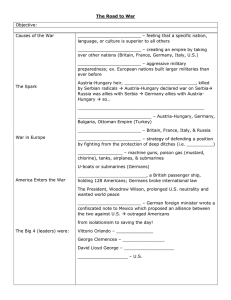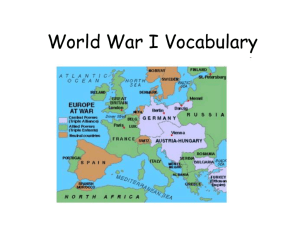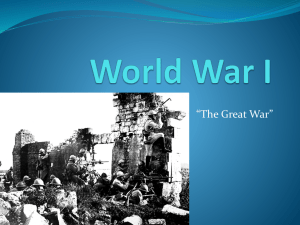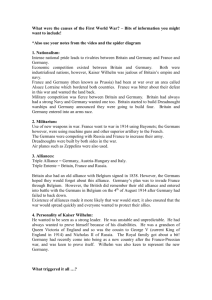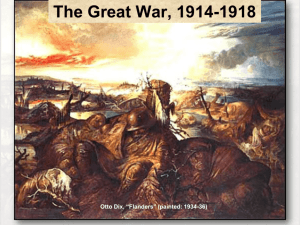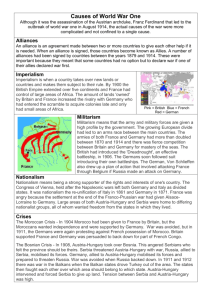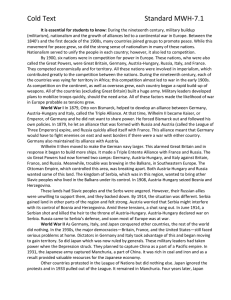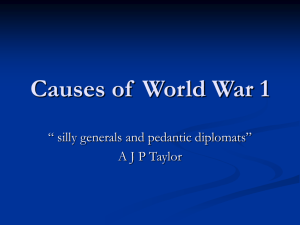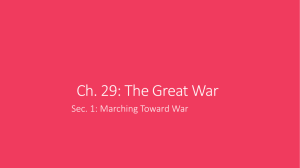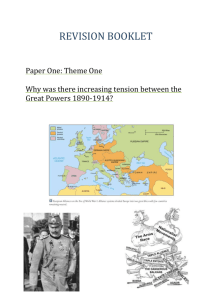Causes of WW1 and Assignment - Claire Zerna's Teaching Portfolio
advertisement
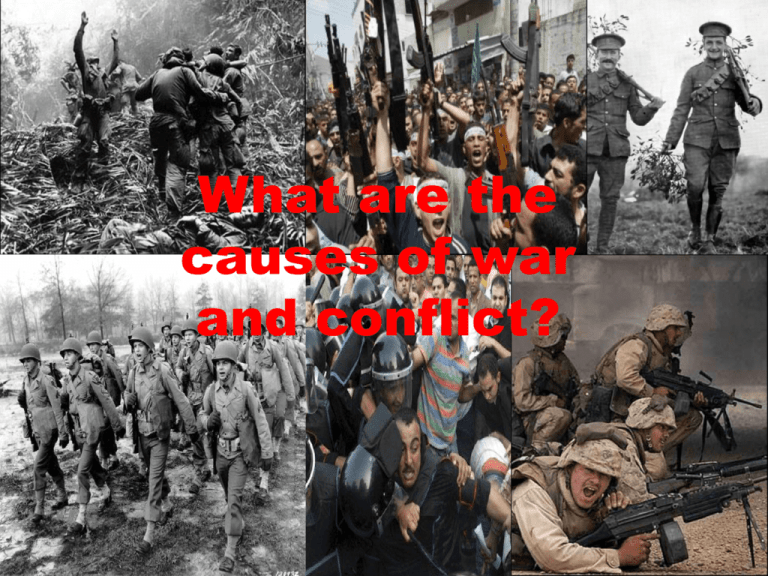
What are the causes of war and conflict? Lead up to War - World War 1 or ‘The Great War’ officially broke out on 4th August 1914. - However, many European countries had been preparing for this war for years. - There are many causes that contributed to war breaking out across Europe. - To understand World War 1 we need to know who the allied countries were. Read through the Allies information and determine who the allies of Britain were and who the allies of Germany were. Alliances: - Germany believed that to protect themselves they should always be in an alliance of three. This group of allies would change constantly. - When the alliance between Russia and Germany failed, Germany was left with the weakest alliance in Europe which was with Austria-Hungary. - Thankfully for the Germans, Italy joined the alliance in 1882, thereby forming the: Triple Alliance/Central Powers - Due to a long hostility between France and Germany and Britain’s battle for naval superiority with Germany, Britain formed an alliance with France. - In 1906 Russia forms an alliance with Britain which creates the : Triple Entente/Allies Germany in the 1900s - In 1860 Germany was considered a ‘backwater’ amongst the powers that ruled Britain, France, Russia, Spain and Italy. - By 1910 Germany was thriving and due to migration, some of the German cities were thriving under urbanisation. - Due to an increased population the labour force was expanded and this meant that Germany now had more wealth per capita than any other country in Europe. - To fight the increasing power of Germany, other European countries revitalised their Imperial Campaigns (Empire Building). - Great Britain, Germany and France needed foreign markets after the increase in manufacturing caused by the Industrial Revolution. - These countries competed for economic expansion in Africa. - Also, in the Middle East, the crumbling Ottoman Empire was appealing to Austria-Hungary, the Balkans and Russia. Cause #1 - By the mid 19th C, Britain was the strongest economic power in Europe and it had the strongest navy. - By 1900 Germany had become the newest power in Europe and was rivaling Britain in terms of Industrial power as well. - However, Germany did not have any room to move in Europe . . . Germany wanted world power and ultimately – WORLD DOMINATION? Cause #2 - With increased competition for land between the super powers, the need for military strength increased. - Spending on building large military forces soon spiraled out of control. - The armies of France and Germany doubled in size from 1870 – 1914. - Britain which had boasted the best navy was concerned about Germany which had the best army and had announced plans to develop its navy. - Germany introduced a new military strategy – in the event of war, Germany would attack France before Russia – ultimately, this is what led to many more nations joining the war. - Each country developed plans for mobilisation that only awaited a go-ahead signal. - This existence of secret battle plans increased espionage, which in turn aroused greater hatred and fear. Militarism Cause #3 - Strong feelings of nationalism fed the fires of hatred in prewar Europe. - It turned Frenchman against German and Russian against Austrian. - These general causes created an atmosphere in Europe which made war a likelihood. Nationalism - Ultimately, this led to the spark that lit the fuse and started the fire! Cause #4 - On June 28, 1914, Serbian fanatic, Gavrilo Princip, assassinated Archduke FranzFerdinand of Austria, while he was in Sarajevo. - A few days after the assassination, Germany assured Austria-Hungary that it would support whatever decision it came to in response to the murder. This has become known as the 'blank cheque'. - Nearly a month after the assassination, Austria-Hungary finally responded with an ultimatum for Serbia. Serbia refused to comply with all the demands made, which included allowing Austro-Hungarian forces into Serbia to assist in arresting organisations which were hostile to them. Austria-Hungary declared war on 28 July. - Once Austria-Hungary declared war on Serbia, the pre-war European alliances came into effect. - Russia came to the defence of Serbia, which made Germany react. - On 1st August Germany declared war on Russia. - Germany put the military strategy known as the Schlieffen plan, which had been developed in 1905, into action. - This meant that France and eventually Britain were also drawn into the conflict. Cause #5 - It can be often argued that the First World War started on the 22nd of April 1915. - On the 22nd of April, not far from the city of Ypres, Belgium, the Germans did something new . . . - They opened cylinders of poison gas to try to break through the defensive strength of the allies on the other side. - French and Canadian troops were hit by this gas, or chlorine gas, and were terrified. - These are men without really any protection against this because it never happened before. - These weren't shells, these were cylinders that had been lined up, and when the German troops thought that the wind was blowing the right way, the cloud opened – it looked very much like a green cloud – and the people who didn't escape from it would have their lungs burned out and die an awful death. Gas Warfare Your Task - Choose one of these causes that you think is the most important contributor to WW1. - Create a timeline for that event on a poster which will need to contain the following information: - Date of the cause - What happened - Who was involved - The contribution this event made to the start of World War 1. - Your poster should be decorated with images and/or quotes that are associated with your cause. - You will need to do research to understand these causes in more detail! - DUE: Next Week!
